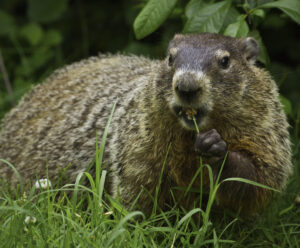Coexisting with your wild neighbors
August 28, 2023
Posted by Lake Erie Nature and Science Center

You have new neighbors. They are messing up your lawn, raiding your garden and knocking over your trash cans. You wish you could ask them to stop, but you’re not sure they will listen.
It’s (hopefully!) not your human neighbors pulling these pranks, but wild ones. Wildlife can seem like a nuisance when they reside in your yard. While it may be tempting to evict the animals by trapping and moving them elsewhere, it is a bad option for several reasons.
It’s illegal to trap and relocate some species
Not only is relocation detrimental to animals, it may also be illegal. Ohio law states that it is illegal to relocate rabies-vector species, including raccoons, skunks, coyotes, foxes and bats. Other species can legally be relocated, but you must have the property owner’s permission to release an animal on their land. It is always illegal to relocate animals to a metro park, state park or any public land without permission.
The animal probably won’t survive
While it may seem humane to relocate an animal instead of euthanizing it, relocation can be harmful. Animals like chipmunks and squirrels spend all spring, summer and fall storing caches of food to survive the winter. It is critical for chipmunks in particular, as they remain in their burrows all winter and rely on their stored food until spring. Without access to these food caches, they will starve to death.
Other animals like woodchuck make elaborate burrows to hibernate in. If you relocate a woodchuck, they may not have enough time to dig a new one before they need to hibernate. Woodchuck will go into hibernation in winter regardless of whether or not they have burrow, and without one they will not survive the harsh conditions.
You will have new neighbors
In the end, relocating an animal will not solve your problem. Removing an animal will result in a different animal moving into your yard if it is still hospitable. Animals like chipmunks are highly unlikely to damage your property, though they do enjoy a free meal from your garden. Luckily, there are humane ways to keep them from your veggies, such as planting daffodils or allium, which chipmunks will avoid as they are bitter and toxic.
To deter unwanted guests like skunks, raccoons and opossums, secure trash carefully, take down bird feeders and do not feed outdoor cats. If you remove food sources, there is no reason for animals to hang around. You can also eliminate convenient hiding places such as wood piles or fence off open spaces under decks to prevent animals from taking residence.
There are many ways to coexist peacefully with wildlife, so think about steps you can take before you call an exterminator. There are also resources who can help! If you have questions about wildlife, or find an animal you believe to be injured or ill, please contact the nonprofit Lake Erie Nature & Science Center at 440-871-2900 or wildlife@lensc.org.

